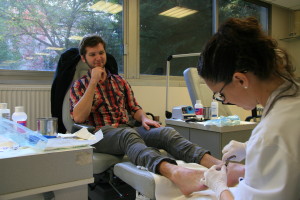Common fungal skin infections are caused by yeasts such as Candida or dermatophytes, such as Epidermophyton, Microsporum, and Trichophyton. Many such fungi live only in the topmost layer of the epidermis (stratum corneum) and do not penetrate deeper.
Doctors may suspect a fungal infection when they see a red, irritated, or scaly rash in one of the commonly affected areas. They can usually confirm the diagnosis by scraping off a small amount of skin and having it examined under a microscope or placed in a culture medium where the specific fungus can grow and be identified.
For any fungal action there may be a reaction. Strangely, fungal infections on one part of the body can cause rashes on other parts of the body that are not infected. For example, a fungal infection on the foot may cause an itchy, bumpy rash on the fingers. These eruptions are allergic reactions to the fungus. They do not result from touching the infected area.
Fungal skin infections are caused by different types of fungi and can be a common culprit of itchy skin. Fungi invade and grow in dead keratin, a protein that makes up your skin, hair and nails. The different types of fungal infections are divided into groups based on what type of fungus is involved.
Some fungi reproduce through tiny spores in the air. You can inhale the spores or they can land on you. As a result, fungal infections often start in the lungs or on the skin. You are more likely to get a fungal infection if you have a weakened immune system or take antibiotics. Fungi can be difficult to kill. For skin and nail infections, you can apply medicine directly to the infected area. Oral antifungal medicines are also available for serious infections.
Our Dermatology department specializes in diagnosing, treating and preventing skin conditions, diseases and cancers. The Dermatology & Aesthetic Center also houses our in-house pathology lab.
Dr. Kenneth Wallace III, M.D. is our Board Certified Dermatologist as well as a Mohs’ Skin Cancer Surgeon.
Phone: 352-237-4133
Fax: 352-873-4581
E-mail: info@ocalafmc.com




